Agriculture and Biosecurity newsletter: August 2023
Welcome to the Agriculture and Biosecurity newsletter for August 2023
Papaya Mealybug found in Darwin suburbs
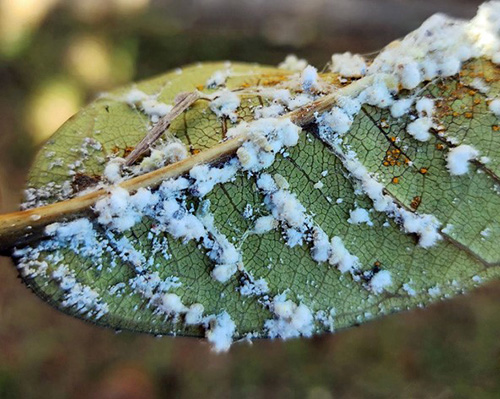
Papaya mealybug was found in the Darwin region.
The suspected Paracoccus marginatus was discovered in Parap, with the surveillance team working now working closely to monitor the surrounding suburbs.
The papaya mealybug appears as a cluster of white 'cotton-like' mass, usually found on the fruit or underside of the leaves of affected plants.
Although the papaya mealybug does not pose a threat to humans or animals, affected plants may appear deformed, wilted and the papaya fruit likely to remain hard and bitter, with the papaya, hibiscus and frangipani species particularly susceptible.
The Plant Biosecurity team will continue surveillance activities and the public is requested to not move suspected infected plants, plant cutting or fruit from their gardens. If you notice a heavy infestation of papaya mealybug on a plant in your garden, you can dispose of the cutting correctly by placing in a sealed refuse bag and disposing in your general waste bin.
Residents of the Darwin region are advised to check plants on their properties and report anything unusual to the Exotic Plant Pest Hotline on 1800 084 881.
During this time, the public are requested to not take cuttings from plants such as hibiscus, frangipani and papaya and to refrain from purchasing plants from uncertified sources.
To treat infected plants, you can spray soft chemicals such as white oil to help plants from becoming heavily infested. They won't harm any parasitoids (good bugs) which may be present.
For more information, head to the webpage Papaya Mealybug
Lumpy Skin Disease Update
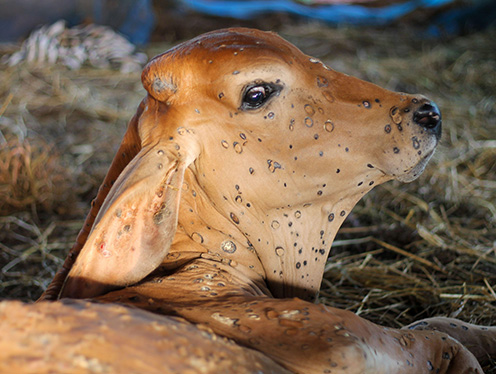
The NT Government is continuing to work closely with the Commonwealth Government and northern jurisdictions following the detection of lumpy skin disease (LSD) in Australian cattle exported to Indonesia last week.
It is important to note that Lumpy Skin Disease has never been detected in Australia, and Australia remains free from LSD.
This was confirmed earlier this week by the Federal Government’s Chief Veterinary Officer Dr Mark Schipp.
LSD is a highly infectious viral disease of cattle and buffalo that causes relatively low mortality—it is not a disease that poses a risk to humans.
The continued movement of LSD around the world is a cause for ongoing concern and vigilance for animal health, welfare and market access reasons.
The process of testing of cattle across Northern Australia is continuing, and the NT Government is working directly with impacted export yards and other properties on rapid diagnostic testing.
There are no restrictions on cattle movements in the NT and cattle can move according to normal requirements, including live export to Indonesia, through registered establishments.
The NT Government has invested significantly into biosecurity and preventative measures over recent times with an additional $2 million per annum for frontline staff in the May 2023 budget. Government will continue engagement with the live cattle export industry to provide assurance that all Territory livestock comply with Indonesian import requirements.
Barramundi stocks increased
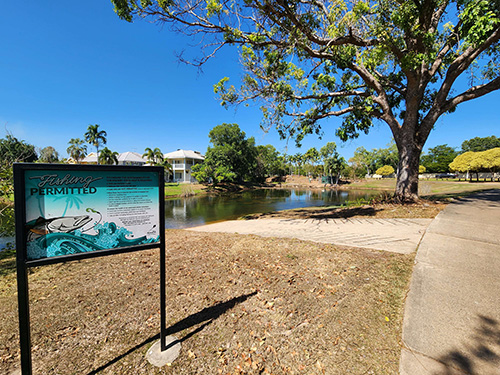
June was a busy month for the team at the Darwin Aquaculture Centre, stocking Barra into Manton Dam and Palmerston lakes and the Fannie Bay area.
Other areas where Barra have recently been release include McMinns Lagoon and Rum Jungle South Lake.
This season we have released 130 juveniles around Palmerston with a further 200 fingerlings to be added to the Palmerston lakes before the end of July.
If you catch a tagged Barra with AFANT green tag or AFANT yellow tag, you can get a free lure if you register some information about when and where you caught the fish. This also helps us know how the released fish are tracking in different locations.
The Barramundi stocking program is funded through the Territory’s Recreational Fishing Futures Fund and was established to provide more recreational fishing opportunities for our community.
To find out more about your limits and the size requirements head to this handy webpage or download the NT Fishing Mate App, which is now available for Android and Apple users.
Reach program
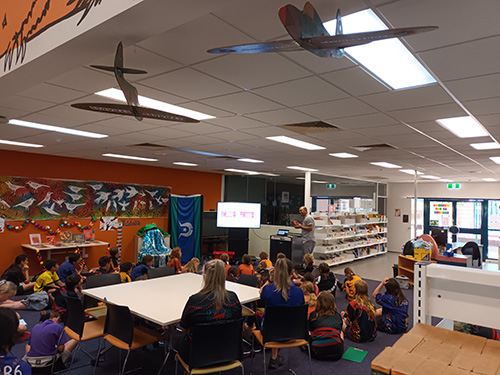
The Plant Biosecurity team recently attended an educational program at Bees Creek primary school where they showcased some of the key projects to a group of young aspiring students highlighting the important role that biosecurity preventative programs play in the Northern Territory (NT).
Plant Biosecurity Officers Ben, Stanley and Vimshi spent some time presenting PowerPoints about Citrus Watch, Banana Freckle and Come Clean/ Go Clean Plant Biosecurity. They followed up with some practical field activities to get the year 5 and 6 students engaged in a hands on learning exercise.
The experience was a great success and has provided a pathway where Plant Biosecurity Officers can engage with younger people to highlight the importance of biosecurity and identify career avenues for student’s right here in the Territory. Biosecurity is an expansive sector and the NT Government is proactively working to ensure the Territory is well protected through significant forms of investment.
In the coming months, the team are eager to continue presenting their educational PowerPoints to the community. If you would like to find out more, please reach out to the Plant Biosecurity team at plantbiosecurity@nt.gov.au.
Banana freckle update
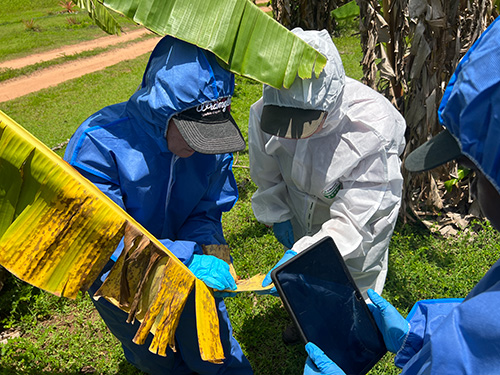
Banana freckle surveillance in Humpty Doo and Girraween
Plant Biosecurity Inspectors are currently checking properties for banana plants and signs of banana freckle disease around the greater Darwin and rural areas.
All properties in areas where the disease has been found are being visited to check if there are banana plants. If no evidence of the disease is found on a properties, then plants will not be destroyed.
The pest is of great concern to the banana industry as it can impact production costs and marketability of fruit.
The Department are asking residents in the Humpty Doo and surrounding areas to call the Banana Freckle team for a banana health check on 8999 2136 or email BananaFreckle.NT@nt.gov.au.
For more information please visit nt.gov.au/banana-freckle or contact the team on 8999 2136 if you have any questions.
NAPCaRN

The Northern Australian Plant Capacity and Response Network (NAPCaRN) has been established to build capacity and capability in the north across industry, First Nations and government stakeholders. This $2.8 million investment, which will be led by the Northern Territory is an initiative intended to attract and retain expertise by supporting and empowering our people, growing and developing our expertise and knowledge, and supporting and facilitating collaborations, partnerships and networks.
The NT’s agriculture sector is worth $1.3 billion and it is vital that we continue to invest to protect it. The NT Government’s investment into strengthening biosecurity functions for this year will be $13 million and NAPCaRN will be in addition to this.
There have been many plant pests found in Northern Australia over the past few years, some of which have been significant in terms of costs to the industry, the environment and the community. NAPCaRN will support and empower industry and community, strengthen the network with increased communication and facilitate collaborations that previously has not been feasible.
NAPCaRN will directly result in improved biosecurity outcomes across northern Australia, which will generate long-term benefits as a whole. The Department of Industry, Tourism and Trade is delighted to lead this project with the support of the Commonwealth, Queensland and Western Australia Government’s. Biosecurity remains a key focus of the NT Government and it is important that we continue to work together with the other jurisdictions to protect our industries, communities and beautiful landscape.
Lunch with Leaders series

The NAPCaRN team is delighted to announce the launch of their ‘Lunch with Leaders’ series. The ‘Lunch with Leaders’ series commences on 4 August, with the first guest speaker confirmed as Cathy McGowan.
This virtual event series endeavours to motivate, encourage and support current and emerging leaders across northern Australia by giving attendees the opportunity to listen to the stories, challenges, advice and lessons of inspiring and courageous leaders.
For those who are interested in being included on the email distribution list for upcoming events and for other initiatives being developed under the NAPCaRN, please contact Dr Anne Walters on anne.walters@nt.gov.au.
NACN
The Northern Australian Coordination Network (NACN) has been developed to bring together the Northern Territory, Queensland, Western Australia and the Commonwealth to help further develop our capabilities to protect Australia from emergency animal diseases (EAD).
More than $4 million of funding was provided by the Commonwealth and will be distributed across the two states and territory, as well as the livestock industries, to help manage the threat of lumpy skin disease (LSD) and foot and mouth disease (FMD).
The group will also help enhance the partnership with key industries and local communities in the north as well as to assist with early detection of, and effective response to biosecurity emergencies.
NT NACN biosecurity coordinators Robbie Dalton and Lucy Morrison are working with their counterparts in the Commonwealth, Queensland and Western Australia to help raise awareness of the importance of surveillance to industry as well as the general public.
With northern Australia at the forefront of these biosecurity threats including FMD and LSD, enhancing capacity and capability across the north is crucial to protect Australia’s livestock industries.
Mrs Morrison who joined the team in early July and brings with her a strong background of communications and media.
“I am really excited to be in this role as it is such meaningful work and it’s great to be working with Robbie Dalton on this important initiative,” she said.
The establishment of this network is part of a federal response to ensure preparedness for biosecurity threats and will supplement existing national priorities, strategies and plans for action.
The Network will increase effective collaboration and co-ordination with key partners around priority EADs.
Mrs Morrison said it was vital that everyone played their part in preventing biosecurity risks.
“Biosecurity is everyone’s business, so if you do see unusual signs in livestock contact Emergency Animal Disease 1800 675 888,” she said.
Give feedback about this page.
Share this page:
URL copied!
